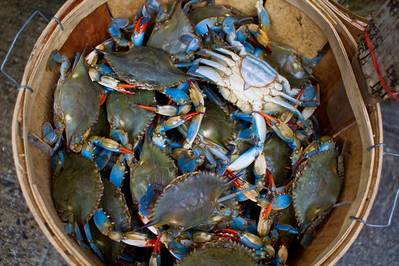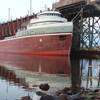Italy Appoints Commissioner to Tackle Spread of Blue Crab
Italy on Tuesday appointed a special commissioner to tackle the spread of the blue crab, an aggressive species that is preying on local clams and threatening a lucrative part of national food production.
Originally from the western Atlantic, blue crabs have proliferated in several locations around the Italian coast, particularly in the Po river delta in the north, where attempts to curb numbers with large fishing campaigns have had little success.
Experts say the blue crabs probably arrived in Italy via shipping ballast water, but it is unclear why they are multiplying so fast or whether there could be a link to climate change.
"The blue crab has compromised some economic activities. But it risks above all to damage the whole sea ecosystem," Agriculture Minister Francesco Lollobrigida told a news conference, where he announced the appointment of commissioner Enrico Caterino.
Agriculture lobby group Coldiretti - which also represents the fishing industry - said in a statement the blue crab had so far caused around 100 million euros ($109 million) of damage, wiping out clam production in the northern Veneto and Emilia Romagna regions.
Italy is Europe's biggest producer of clams, and the third largest in the world behind China and South Korea, according to U.N. data from 2021. It is also home to "spaghetti alle vongole" (spaghetti with clams), a classic of Italian cuisine.
The government of Prime Minister Giorgia Meloni last year earmarked some 2.9 million euros ($3.2 million) to help businesses damaged by the blue crab.
"It is a catastrophe. We are at zero production. We are only catching crabs," said Paolo Mancin, head of the Fishermen's Cooperative of the Polesine, part of the Po delta.
Environment Minister Gilberto Pichetto Fratin voiced concerns that the predator may spill over to other parts of Italy from the eastern Adriatic Sea, whose waters have touched above average temperatures in recent weeks.
"Our aim is to reduce (the blue crabs) presence in the Adriatic and avoid a massive spread to other areas," the minister told reporters, without saying what kind of measures could be taken to tackle the invasive species.
(Reuters - Reporting by Angelo Amante; Editing by David Holmes)












